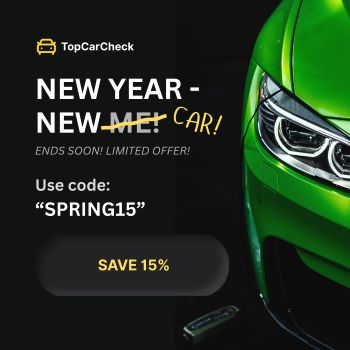These UK Car Scams Are Still Catching People Out in 2025

Spring Offer

Here’s a deep dive into the most common UK car scams right now, how they work, and exactly how to protect yourself.
🚗 Scam #1: Fake Listings on Marketplace - Too Good to Be True?
One of the most widespread scams involves fake car listings on Gumtree, Facebook Marketplace, or lesser-known platforms. Scammers post a really cheap car - with no intention of delivering it.
How it works:
The car doesn’t exist.
They ask for a deposit or full payment upfront.
The seller disappears once you pay.
You lose the cash - often without any trace.
“If it looks too good to be true, it probably is.” - Mike Brewer, Wheeler Dealers warning on recent scams.The Sun
How to avoid it:
Never pay before seeing/driving the car.
Meet in person, ideally at the seller’s address.
Use a debit or credit card to retain chargeback options.
Test drive before transferring any money.
Scam #2: Dirty Oil Trick - Sabotaging Engines to Lowball Sellers
This nasty scam targets private sellers. Fraudsters pretend to inspect your car, then secretly pour engine oil into the coolant during a test drive. Afterwards, the car smokes and stalls - they offer to buy it drastically below your asking price.
What to look for:
Distractions during the viewing or test drive.
Visitors asking to poke around under the bonnet unsupervised.
Engine smoke shortly after test driving.
How to avoid it:
Never let buyers look alone under the bonnet.
Take photos of your engine bay and coolant/oil levels before any viewing.
Do the coolant check yourself with them present.
If something feels off - stop the viewing immediately.news.dorset.police.uk
Scam #3: Dodgy Dealerships That Vanish with Your Car & Cash
Some dealers take it to the next level. ITV News exposed one called Happier Cars in Essex that allegedly scammed over £740,000 from customers. People handed over their cars to sell on commission - and were never paid or had cars returned.ITVX
Signs to watch for:
You never get paid after your car is sold.
Cars you sell get flagged as stolen by police.
The dealership signs on the door suddenly disappear.
How to protect yourself:
Don’t hand your car to a dealer unless you have a contract and proof of sale.
Avoid companies that promise to sell your car for you without upfront transparency.
Search reviews and news before trusting any commission-based car brokerage.
Scam #4: Vehicle Matching Scams - Fees for a Buyer That Never Materialises
These scams promise to match your car with a buyer - for a fee. You pay upfront, but no buyer ever comes. Seems legit, right? But clients are left with empty promises and a lighter wallet.thetimes.co.uk
How to spot them:
Calls or emails from 'agents' offering guaranteed sales.
Pressure to pay immediately for 'buyer access'.
No follow-up from the company after payment.
Stay safe by:
Avoiding upfront fees for buyer matching services.
Going directly through trusted platforms like Auto Trader, Motors.co.uk, or reputable dealerships.
Scam #5: Title Washing & Hidden History
Unscrupulous sellers can hide a car’s history - write-offs, mileage clocking, or stolen status - by altering documents or swapping number plates or VINs.
What shows up:
MOT history that doesn’t match service stamps.
Mileage rollbacks visible in MOT records.
VIN mismatch between logbooks and the car itself.
What to do:
Always run a full vehicle history check at TopCarCheck.co.uk.
Cross-reference MOT & service data for consistency.
Match VIN numbers across documents and the car chassis.
Scam #6: Pressure, Deposits & Fake Escrow Schemes
Some scammers offer fake escrow or agency services. They say your money is protected - but it’s not. Often the buyer asks for the cash to be “held,” and you never see the car - or the cash - again.
How to avoid it:
Never send money to a “holding account.”
Insist on seeing the car before paying.
Use traceable payment methods only (credit or debit card at most risk-free).
🚨 Pro Tips to Spot Scams & Buy Safely
1. Always check the reg first Never agree to buy without the read reg number. Use TopCarCheck to reveal everything hidden.
2. Watch for low prices Fraudsters lure victims with ridiculously cheap prices. Compare market values using Auto Trader or Parkers.
3. Insist on meeting in person Scammers often avoid real meetups. If they refuse, walk away.
4. Bring someone with you Asking you to view alone? That’s never a good sign.
5. Never pay full price upfront At least test drive first. Use secure payment methods only.
6. Check documents carefully Inspect V5C, service records, MOT stamps. Look for tampering or inconsistencies.
Real-World Example: The Happier Cars Scam
ITV News uncovered that Happier Cars in Essex collected over £740,000 in cons, as dozens lost cars or monies. Victims reported missing payouts and seized cars flagged as stolen. Almost all signed over their vehicles for sale and never heard back.
Final Thoughts: Stay Sharp, Stay Safe
Car scams haven't gone away in 2025. If anything, fraud is more sophisticated than ever. But there’s a smarter way to shop and stay safe:
Be wary of deals that look too good.
Verify listings and sellers thoroughly.
Always run a vehicle history check.
Trust your gut - if something feels off, walk away.
Use TopCarCheck.co.uk before making any decisions. It’s fast, easy, and gives you the info you need to stay protected.
Spring Offer

Enter Registration Number
Enter a UK vehicle registration to start your check
Secure checkout via Stripe